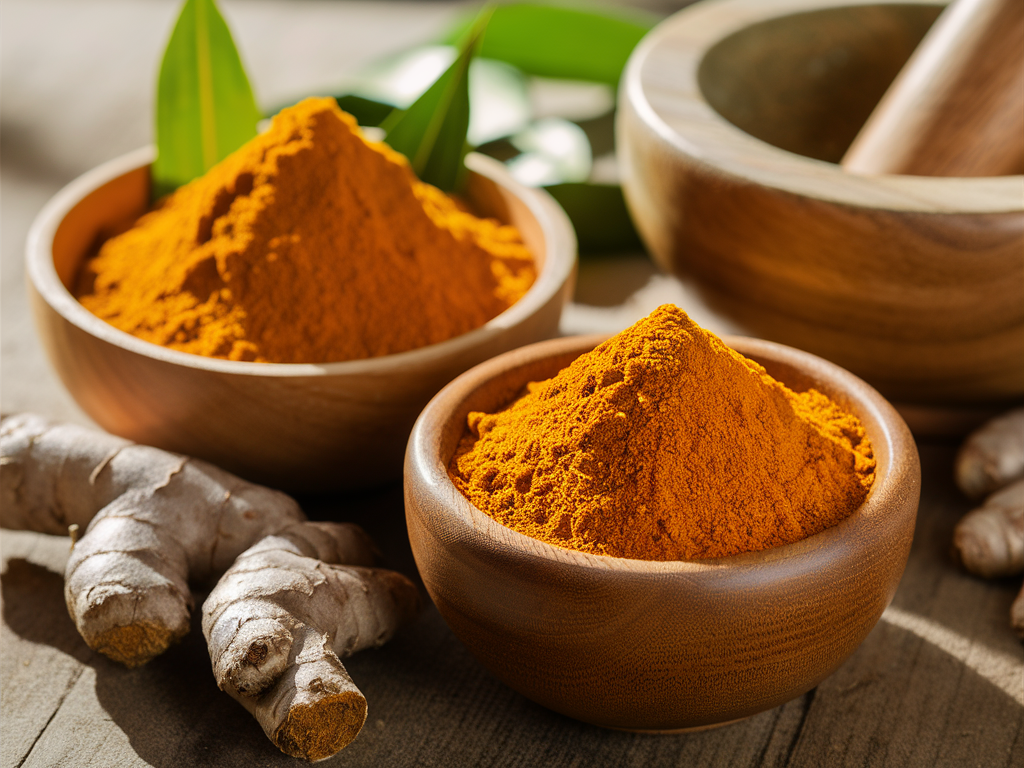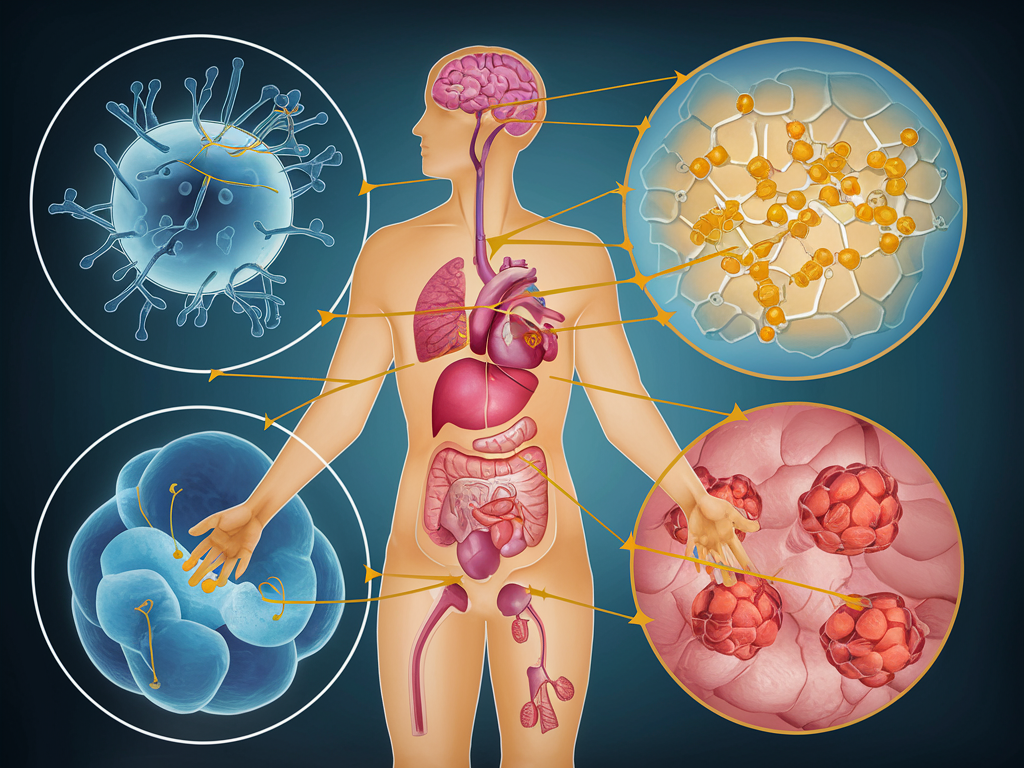Turmeric, the golden spice that has colored and flavored cuisine for centuries, has transcended its culinary roots to become a cornerstone of modern wellness practices. This vibrant yellow rhizome, scientifically known as Curcuma longa, has been a staple in Ayurvedic and traditional Chinese medicine for over 4,000 years. What makes this ancient spice so remarkable is curcumin, its primary active compound, which research has shown possesses powerful biological properties that can benefit multiple aspects of human health.
As Western science catches up with traditional wisdom, turmeric has exploded in popularity, appearing in everything from supplements and smoothies to skincare products and pharmaceutical research. This renewed interest isn’t just marketing hype—it’s backed by a growing body of scientific evidence supporting turmeric’s diverse therapeutic potential.
In this comprehensive guide, we’ll explore 12 science-backed benefits of turmeric that demonstrate why this golden spice deserves a place in your health regimen. From its potent anti-inflammatory properties to its potential in disease prevention, these benefits reveal why turmeric has stood the test of time and continues to impress researchers worldwide.
1. Powerful Anti-inflammatory Properties
Inflammation is your body’s natural response to injury and infection, playing a crucial role in healing. However, when inflammation becomes chronic, it can contribute to numerous health conditions including heart disease, cancer, metabolic syndrome, and various degenerative disorders.
Curcumin, the star compound in turmeric, has emerged as a powerful anti-inflammatory agent. Research indicates that it works by blocking Nuclear Factor kappa B (NF-?B), a molecule that travels into cell nuclei and triggers genes related to inflammation. This mechanism is significant because NF-?B is believed to play a major role in many chronic diseases.
Studies have shown curcumin’s anti-inflammatory effects can match some pharmaceutical anti-inflammatory drugs, but without the side effects. A landmark 2004 study published in Oncogene found that curcumin was more effective than both aspirin and ibuprofen in reducing inflammation.
For those suffering from inflammatory conditions like arthritis, incorporating turmeric into their daily routine may help manage symptoms and reduce dependence on over-the-counter medications. The recommended therapeutic dose typically ranges from 500-2,000 mg of curcumin per day, often taken in supplement form to achieve these higher concentrations.
2. Potent Antioxidant Effects
Oxidative damage is considered one of the primary mechanisms behind aging and many diseases. This damage occurs when unstable molecules called free radicals react with important organic substances in our bodies, such as fatty acids, proteins, or DNA.
Curcumin is a potent antioxidant that can neutralize free radicals due to its chemical structure. However, what makes curcumin truly remarkable is its dual approach to fighting oxidative stress. Not only does it directly neutralize free radicals, but it also stimulates your body’s own antioxidant enzymes, creating a two-pronged defense system.
Research published in the International Journal of Molecular Sciences has demonstrated that curcumin can increase the activity of antioxidant enzymes such as superoxide dismutase, catalase, and glutathione peroxidase. This cascading effect amplifies its antioxidant capacity far beyond simple dietary antioxidants.
This powerful antioxidant activity has profound implications for preventing cellular damage, slowing the aging process, and protecting against numerous diseases linked to oxidative stress, including heart disease, cancer, and neurodegenerative conditions.

3. Improves Brain Function and Lowers Risk of Brain Diseases
Emerging research suggests turmeric may be one of the most promising natural compounds for brain health. The key to this benefit lies in curcumin’s ability to increase levels of Brain-Derived Neurotrophic Factor (BDNF), a growth hormone that functions in the brain.
BDNF promotes the formation of new neurons and fights various degenerative processes in the brain. Many common brain disorders, including depression and Alzheimer’s disease, have been linked to decreased levels of BDNF. By boosting BDNF, curcumin may delay or even reverse many brain diseases and age-related decreases in brain function.
Particularly exciting is curcumin’s potential role in Alzheimer’s prevention. Research published in the Annals of Indian Academy of Neurology indicates that curcumin can cross the blood-brain barrier and has been shown to lead to various improvements in the pathological process of Alzheimer’s disease. It may help clear the amyloid plaques that are a hallmark of this condition.
Animal studies have shown that curcumin can improve memory and cognitive function, while human research remains ongoing. A study in the American Journal of Geriatric Psychiatry found that curcumin supplementation improved memory performance in people without dementia and significantly affected the levels of amyloid and tau in brain regions that control memory.
4. Reduces Heart Disease Risk
Heart disease remains the world’s number one cause of death, and turmeric may offer significant protection through multiple pathways. One of curcumin’s major benefits for heart health involves improving endothelial function—the health of the thin membrane that covers the inside of the heart and blood vessels, which regulates blood pressure and blood clotting.
Research published in Nutrition Research found that curcumin supplementation was as effective as exercise in improving endothelial function in postmenopausal women. The antioxidant and anti-inflammatory properties of curcumin also play a role in heart protection by reducing oxidative stress and inflammation, both contributors to heart disease.
Furthermore, studies suggest curcumin may help reduce LDL “bad” cholesterol levels and prevent the oxidation of cholesterol, which is a key step in the development of heart disease. A meta-analysis published in Nutrition Journal found that curcumin supplementation significantly decreased LDL cholesterol and triglycerides while increasing HDL “good” cholesterol levels.
For heart health, experts typically recommend 500-1,000 mg of curcumin daily, preferably with black pepper extract to enhance absorption. However, it’s important to consult with a healthcare provider before starting any supplement regimen, especially for those already taking cardiovascular medications.
5. Cancer Prevention and Treatment Potential
Cancer is characterized by uncontrolled cell growth, and research into curcumin’s anti-cancer properties has revealed promising effects at various stages of cancer development, growth, and spread. Studies suggest that curcumin can affect cancer at the molecular level through multiple pathways.
Laboratory research has demonstrated that curcumin can reduce angiogenesis (growth of new blood vessels in tumors), contribute to cancer cell death, and inhibit metastasis (cancer spread). A review in the journal Anticancer Research summarized multiple studies showing curcumin can reduce the growth of cancerous cells in laboratory settings and inhibit the growth of tumors in animal studies.
Particularly promising is research on digestive cancers. A 30-day clinical trial in 44 men with lesions in the colon that sometimes turn cancerous showed that 4 grams of curcumin per day reduced the number of lesions by 40%. Studies on pancreatic cancer have shown that curcumin can help make traditional chemotherapy drugs more effective while reducing their toxic side effects.
While research is ongoing and curcumin is not currently used as a conventional cancer treatment, these findings suggest it may have potential as a complementary approach or preventive measure. Several clinical trials are underway to better understand how curcumin might be used in cancer therapy.
6. May Help Prevent and Treat Arthritis
Arthritis, characterized by joint inflammation, is a common condition that causes pain and reduced mobility for millions worldwide. Given curcumin’s established anti-inflammatory properties, it’s not surprising that it shows promise for arthritis management.
Both rheumatoid arthritis (an autoimmune condition) and osteoarthritis (degenerative joint disease) involve inflammation, though through different mechanisms. Studies indicate curcumin may help with both types. In rheumatoid arthritis, curcumin appears to modify immune system responses that drive joint inflammation. For osteoarthritis, it may protect cartilage from degradation while reducing inflammatory markers.
A study published in the Journal of Medicinal Food found that a curcumin-containing supplement reduced pain and improved physical function in patients with osteoarthritis. Another notable study in Phytotherapy Research compared curcumin to the NSAID drug diclofenac in rheumatoid arthritis patients and found that the curcumin group showed better improvement in disease activity scores and reported fewer side effects.
For arthritis management, experts typically recommend standardized curcumin extracts at doses between 500-1,000 mg daily. Using formulations that enhance bioavailability through technologies like liposomal delivery, nanoparticles, or the addition of piperine (black pepper extract) may increase effectiveness.

7. Benefits for Digestive System Health
Turmeric has been used as a digestive aid in traditional medicine for centuries, and modern science is now validating this application. The digestive benefits of curcumin stem primarily from its anti-inflammatory, antioxidant, and antimicrobial properties.
Gut inflammation underlies many digestive disorders, and curcumin’s ability to suppress inflammatory molecules makes it potentially beneficial for conditions like irritable bowel syndrome (IBS), inflammatory bowel disease (IBD), and other gastrointestinal issues. Research published in the Journal of Medicinal Food found that curcumin supplementation helped reduce IBS severity and improved the quality of life for people with this condition.
For inflammatory bowel diseases like Crohn’s disease and ulcerative colitis, multiple clinical trials have shown promise. One study in the journal Clinical Gastroenterology and Hepatology found that curcumin, when added to standard therapy, was effective in inducing remission in patients with mild-to-moderate ulcerative colitis.
Beyond its anti-inflammatory effects, turmeric stimulates bile production in the liver, which helps break down dietary fat. It may also reduce intestinal spasms and flatulence, making it helpful for general digestive discomfort. For digestive health, incorporating turmeric into cooking or taking supplements (typically 500 mg twice daily) may provide relief for various gastrointestinal issues.
8. Depression Management
Depression is a serious mood disorder characterized by persistent feelings of sadness and loss of interest. Emerging research suggests that curcumin may have antidepressant properties through several mechanisms related to brain function and inflammatory pathways.
One key way curcumin may combat depression is by boosting levels of brain neurotransmitters like serotonin and dopamine, which regulate mood, pleasure, and a sense of wellbeing. Curcumin appears to inhibit monoamine oxidase, an enzyme that breaks down these neurotransmitters, potentially leading to higher concentrations in the brain.
The anti-inflammatory properties of curcumin may also play a role in depression management, as increasing evidence links chronic inflammation to depressive disorders. By reducing inflammatory markers, curcumin may address underlying biological factors contributing to depression.
A groundbreaking study published in Phytotherapy Research found that curcumin was as effective as fluoxetine (Prozac) in managing depression. Another 6-week study in the Journal of Affective Disorders reported that curcumin significantly reduced depression symptoms compared to placebo, with the highest impact seen when combined with saffron.
While these results are promising, it’s crucial to note that depression is a complex condition requiring professional assessment. Curcumin may be best viewed as a complementary approach rather than a replacement for conventional treatment, especially for severe depression.
9. Anti-Aging Properties and Longevity Effects
The quest for longevity and graceful aging has led researchers to investigate compounds that affect the fundamental cellular processes of aging. Curcumin has emerged as a potential anti-aging substance through its effects on several key mechanisms involved in cellular aging.
At the cellular level, curcumin appears to influence telomeres, the protective caps on chromosomes that shorten with age. Preliminary research suggests curcumin may help maintain telomere length, potentially slowing cellular aging. It also appears to reduce cellular senescence—the process by which cells stop dividing and start secreting inflammatory compounds that accelerate aging.
Beyond these cellular mechanisms, curcumin’s well-established antioxidant and anti-inflammatory properties contribute to its anti-aging potential by protecting cells from damage that accumulates with age. Studies published in Immunity & Ageing have demonstrated that curcumin can modulate various age-related pathways, potentially extending lifespan in model organisms.
While human studies on curcumin and longevity are still emerging, research shows it may help prevent or delay age-related conditions like arthritis, cognitive decline, and cardiovascular disease. The compound seems to support what scientists call “healthspan”—not just living longer, but maintaining health and functionality during those additional years.
10. Skin Health and Beauty Benefits
Turmeric’s benefits extend to skin health, offering both internal and topical advantages for various skin conditions and cosmetic concerns. The curcumin in turmeric provides multiple mechanisms for improving skin health, including anti-inflammatory, antimicrobial, and antioxidant effects.
For inflammatory skin conditions like psoriasis, eczema, and acne, curcumin’s ability to suppress inflammatory molecules can help reduce redness, swelling, and irritation. Research published in the International Journal of Molecular Sciences shows that curcumin can inhibit the activity of phosphorylase kinase, an enzyme linked to psoriasis activity.
As a powerful antioxidant, curcumin helps protect skin cells from oxidative damage caused by UV radiation and environmental pollutants. This protection may help prevent premature aging, including wrinkle formation and pigmentation changes. Studies have shown that curcumin can regulate collagen production and inhibit enzymes that break down elastin, potentially maintaining skin elasticity and firmness.
Curcumin’s wound-healing properties are also noteworthy. Research in the journal Life Sciences demonstrated that it can enhance tissue formation, improve collagen deposition, and increase blood vessel formation in wounds, accelerating the healing process.
For skin benefits, both internal consumption (via supplements or dietary inclusion) and topical application can be effective. Commercial products containing turmeric extracts are increasingly available, from serums to masks. For DIY enthusiasts, a simple turmeric mask can be made by mixing turmeric powder with honey, yogurt, or aloe vera gel, though be aware it may temporarily stain the skin.
11. Supports Liver Health and Detoxification
The liver performs hundreds of essential functions, including filtering toxins from the blood and metabolizing nutrients. Turmeric has been used as a liver tonic in traditional medicine systems for centuries, and modern research is beginning to understand why.
Curcumin appears to enhance the liver’s detoxification processes by stimulating the production of glutathione S-transferase and other phase II detoxification enzymes. These enzymes help transform toxic compounds into water-soluble forms that can be more easily excreted from the body. This mechanism may help protect the liver from damage caused by environmental toxins, certain medications, and alcohol.
Research published in BMC Complementary and Alternative Medicine demonstrates curcumin’s hepatoprotective effects against various toxic substances. Animal studies show that curcumin can help prevent liver damage from toxins like carbon tetrachloride and acetaminophen by reducing oxidative stress and inflammatory responses in liver tissue.
For those with liver conditions, curcumin shows promise as well. Studies indicate it may help manage non-alcoholic fatty liver disease (NAFLD) by reducing liver fat, inflammation, and oxidative stress. A clinical trial published in Drug Research found that curcumin supplementation reduced liver fat content and enzyme levels in NAFLD patients.
To support liver health, experts recommend 500-1,500 mg of curcumin daily, preferably with enhanced bioavailability formulations. However, those with gallbladder disease or taking certain medications should consult healthcare providers before supplementing, as curcumin may stimulate bile production and interact with some drugs.

12. Enhanced Immune System Function
A robust immune system is crucial for overall health, defending against pathogens while maintaining tolerance to harmless substances. Curcumin affects the immune system in complex ways, modulating various components and signaling pathways to potentially enhance immune defense while helping prevent excessive or inappropriate immune responses.
Research published in the Journal of Clinical Immunology shows that curcumin can modulate the activation of T cells, B cells, macrophages, neutrophils, and natural killer cells—all key players in the immune response. It appears to enhance antibody responses while also helping regulate cytokine production, the signaling molecules that coordinate immune activity.
This immunomodulatory effect makes curcumin potentially beneficial for autoimmune conditions where the immune system attacks healthy tissues. Studies suggest it may help manage conditions like rheumatoid arthritis, multiple sclerosis, and inflammatory bowel disease by dampening excessive immune responses while preserving normal immune function.
Curcumin’s antimicrobial properties also contribute to immune defense. Research has demonstrated its activity against various bacteria, viruses, and fungi. During cold and flu season, incorporating turmeric into the diet or taking supplements may help support immune function and resistance to respiratory infections.
A typical immune-supporting dose ranges from 500-1,000 mg of curcumin daily. For enhanced benefits during acute illness, some practitioners recommend temporarily increasing the dose, though this should be done under healthcare supervision.
Conclusion
The scientific exploration of turmeric reveals why this ancient spice has stood the test of time as a medicinal agent. From its potent anti-inflammatory and antioxidant properties to its specific benefits for brain, heart, joint, and skin health, turmeric offers a remarkable range of potential health advantages backed by growing scientific evidence.
However, it’s important to note that most studies have focused on curcumin, which constitutes only about 3-5% of turmeric by weight. To experience therapeutic benefits, concentrated extracts or supplements are often necessary. Additionally, curcumin has poor bioavailability—the body struggles to absorb and utilize it efficiently. This limitation can be overcome by combining curcumin with black pepper (which contains piperine) or consuming it with healthy fats, both of which enhance absorption significantly.
For general wellness support, dosages typically range from 500-2,000 mg of curcumin per day, depending on the specific health concern. Various formulations are available, including capsules, softgels, powders, and liposomal preparations with enhanced bioavailability.
While turmeric is generally considered safe for most people, it may interact with certain medications, including blood thinners, diabetes drugs, and acid reducers. Those with gallbladder disease should use caution, as curcumin stimulates bile production. As with any supplement, it’s advisable to consult with a healthcare provider before beginning regular supplementation, especially if you have existing health conditions or take medications.
Whether incorporated into your diet through golden milk, curry dishes, and soups, or taken as a supplement, turmeric offers a natural approach to supporting overall health and addressing specific concerns. Its long history of traditional use, combined with mounting scientific evidence, makes it one of the most promising natural compounds for health and wellness in our modern world.

